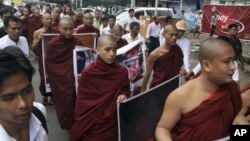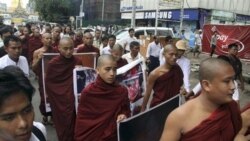Last year has seen significant shrinkage of the arena available for civic activism, as many authorities sought to limit the influence of civil society, said Secretary of State John Kerry:
“Governments continue to restrict civil society. They suppress dissent, and they stifle free expression. Religious minorities find themselves in prison for violating blasphemy laws. Online activists are shut down for criticizing their governments, or shining light on corruption, or just trying to speak out and express their view about a different future.
"LGBT communities are marginalized or criminalized. Women and girls are being targeted through rape as a weapon of war, and being attacked for the simple act of going to school - going to school. These tactics are as intolerable as they are shortsighted. They hold countries back, they create instability, they divide societies, and they set off cycles of retribution.”
Numerous governments passed a rash of laws designed to restrict the activities and effectiveness of civil society.
Russia adopted measures that stigmatized and curtailed the activities of NGOs and restricted civil liberties. Egypt conducted police raids against prodemocracy and human rights groups, and charged citizens and foreign personnel with “running unlicensed organizations” and “receiving foreign funds without permission.”
Bangladesh abridged the ability of labor unions to recruit new members and conduct their activities. And China imposed registration requirements that effectively prevented the formation of independent political, human rights, religious, spiritual, labor and other non-governmental organizations.
“In those places where human rights and fundamental freedoms are denied, it is far easier for these negative destabilizing influences to take hold, threatening international stability,” said Secretary of State John Kerry.
“The United States stands with people and governments that aspire to freedom and democracy. . . . As part of this commitment, we advocate around the world for governments to adopt policies and practices that respect human rights regardless of ethnicity, religion, gender, race, sexual orientation, or disability; that allow for and honor the results of free and fair elections; that ensure safe and healthy workplaces; and that respect peaceful protests and other forms of dissent.
“The United States continues to speak out unequivocally on behalf of the fundamental dignity and equality of all persons."
“Governments continue to restrict civil society. They suppress dissent, and they stifle free expression. Religious minorities find themselves in prison for violating blasphemy laws. Online activists are shut down for criticizing their governments, or shining light on corruption, or just trying to speak out and express their view about a different future.
"LGBT communities are marginalized or criminalized. Women and girls are being targeted through rape as a weapon of war, and being attacked for the simple act of going to school - going to school. These tactics are as intolerable as they are shortsighted. They hold countries back, they create instability, they divide societies, and they set off cycles of retribution.”
Numerous governments passed a rash of laws designed to restrict the activities and effectiveness of civil society.
Russia adopted measures that stigmatized and curtailed the activities of NGOs and restricted civil liberties. Egypt conducted police raids against prodemocracy and human rights groups, and charged citizens and foreign personnel with “running unlicensed organizations” and “receiving foreign funds without permission.”
The United States stands with people and governments that aspire to freedom and democracy."U.S. Secretary of State John Kerry
“In those places where human rights and fundamental freedoms are denied, it is far easier for these negative destabilizing influences to take hold, threatening international stability,” said Secretary of State John Kerry.
“The United States stands with people and governments that aspire to freedom and democracy. . . . As part of this commitment, we advocate around the world for governments to adopt policies and practices that respect human rights regardless of ethnicity, religion, gender, race, sexual orientation, or disability; that allow for and honor the results of free and fair elections; that ensure safe and healthy workplaces; and that respect peaceful protests and other forms of dissent.
“The United States continues to speak out unequivocally on behalf of the fundamental dignity and equality of all persons."






